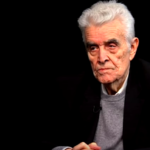Interesting (to me) quote from an 1853 book by John Ruskin, The Stones of Venice:
And the great cry that rises from all our manufacturing cities, louder than their furnace blast, is all in very deed for this, — that we manufacture everything there except men; we blanch cotton, and strengthen steel, and refine sugar, and shape pottery; but to brighten, to strengthen, to refine, or to form a single living spirit, never enters into our estimate of advantages.
I haven’t read the book (yet) but I take Ruskin to be a critic of the aesthetic degradation that accompanied industrialization. Wonder what he’d think now. This quote was in a piece by Tristam Hunt in the Wall Street Journal 1/26/19.
 Now on to Rene Girard. I think I mentioned in an earlier post that I was reading Girard’s I See Satan Fall Like Lightning. I find his work extremely compelling and scribbled notes like mad so I could tell you all about it. But then along came Rod Dreher in his blog of 1/28/19, talking about Girard in the context of understanding the brouhaha over the Covington Catholic boys at the Washington protest recently. Here is Dreher’s sound take on Girard:
Now on to Rene Girard. I think I mentioned in an earlier post that I was reading Girard’s I See Satan Fall Like Lightning. I find his work extremely compelling and scribbled notes like mad so I could tell you all about it. But then along came Rod Dreher in his blog of 1/28/19, talking about Girard in the context of understanding the brouhaha over the Covington Catholic boys at the Washington protest recently. Here is Dreher’s sound take on Girard:
“Roughly speaking, [Girard’s theory] unfolds as follows. When tensions arise in a group (as they inevitably do), people commence to cast about for a scapegoat, for someone or some group to blame. Deeply attractive, even addictive, the scapegoating move rapidly attracts a crowd, which in short order becomes a mob. In their common hatred of the victim, the blamers feel an ersatz sense of togetherness. Filled with the excitement born of self-righteousness, the mob then endeavors to isolate and finally eliminate the scapegoat, convinced that this will restore order to their roiled society. . . . Hitler ingeniously exploited the scapegoating mechanism to bring his country together—obviously in a profoundly wicked way.
* * *
In I See Satan Fall Like Lightning, Girard writes about how the “concern for victims” is what sets Judaism and Christianity apart from all other archaic religions. This concern for victims has now been virtually universalized, even — paradoxically — as Christianity has begun to decline, at least in the West.
* * *
[About Nietzche, Girard wrote] “He opposes, so he believes, the crowd mentality, but he does not recognize his Dionysian stance as the supreme expression of the mob in its most brutal and its most stupid tendencies. Christianity does not yield to ulterior motives of resentment in its concern to rehabilitate victims. It is not seduced by a contaminated charity of resentment. What it does is to rectify the illusion of myths; it exposes the lie of the ‘satanic accusation.'”
Since Nietzsche is blind to mimetic rivalry [a key Girardian concept; this is what causes violence] and its contagion, he doesn’t see that the Gospel stance toward victims does not come from prejudice in favor of the weak against the strong but is heroic resistance to violent contagion. Indeed, the Gospels embody the discernment of a small minority that dares to oppose the monstrous mimetic contagion of a Dionysian lynching.
Now, here is where Girard becomes especially interesting, and relevant to our moment. He says that today, “we hear repeated in every way that we no longer have an absolute,” but in fact the concern for victims “is our absolute.” That is, it is the basis for our morality: “it is the concern for victims that determines what is most important.” This is the case because all other sources of absolute value have been lost.
In his final chapter, Girard praises the “heroism” of the scattered disciples in the wake of Jesus’s resurrection. They had no power, and in fact, knew that they had participated in “the violent contagion that murdered their master” (e.g., Peter’s denial). What they had was the power of their belief, and their ability to communicate what they had seen and experienced. And this ultimately subverted the dominant paradigm of the ancient world, which believed that scapegoats were real and necessary.
Girard believes that only genuine divine power gave them the strength to do this. He believes that it is impossible to break the spell that drives humanity to scapegoating violence without believe in “a power superior to violent contagion.” In other words, the God of the Bible.”
